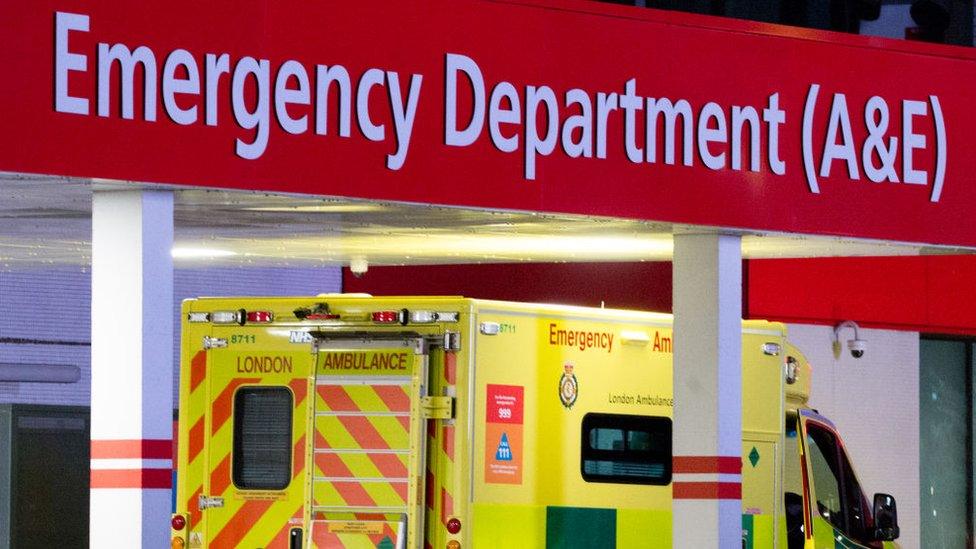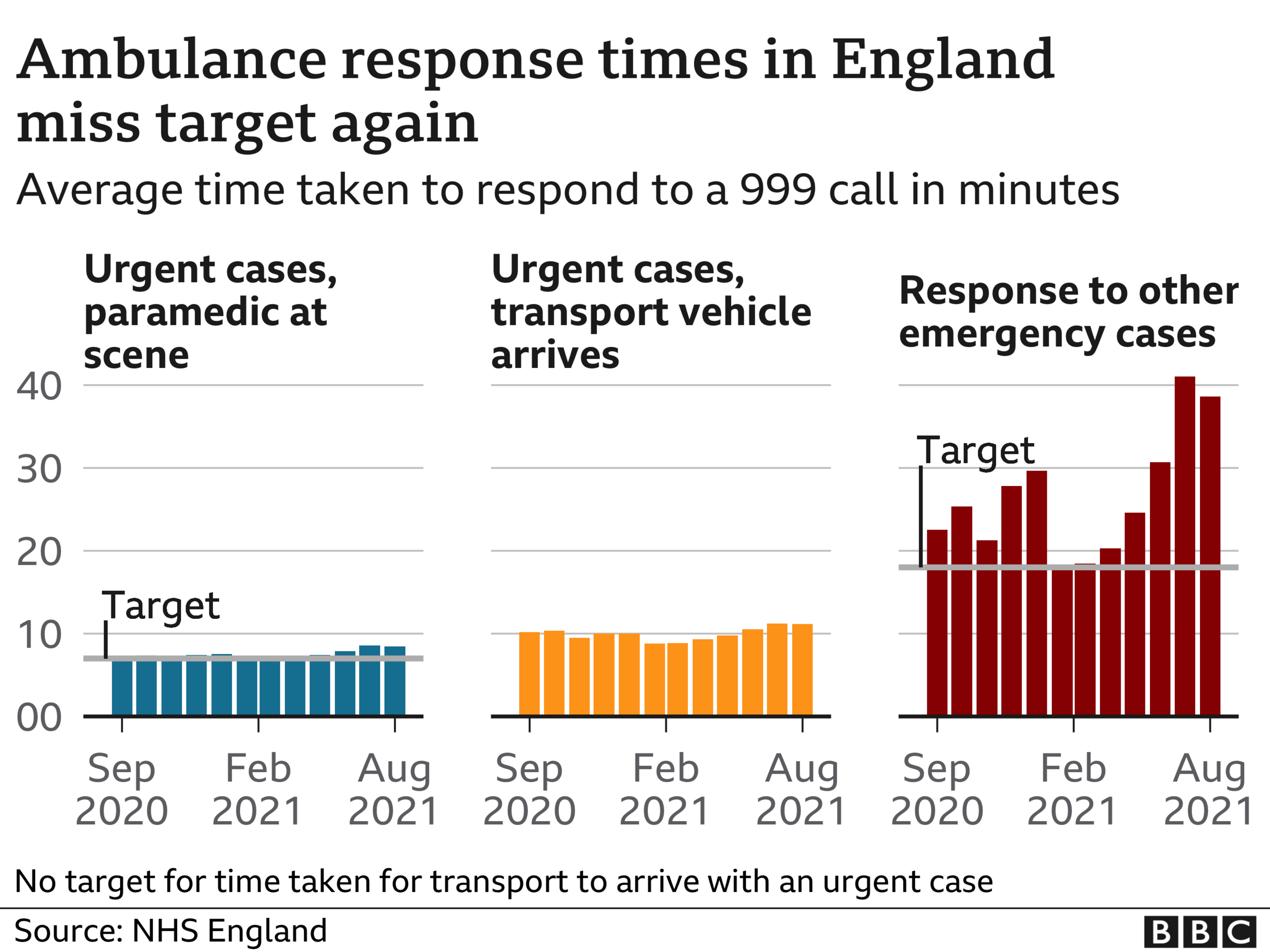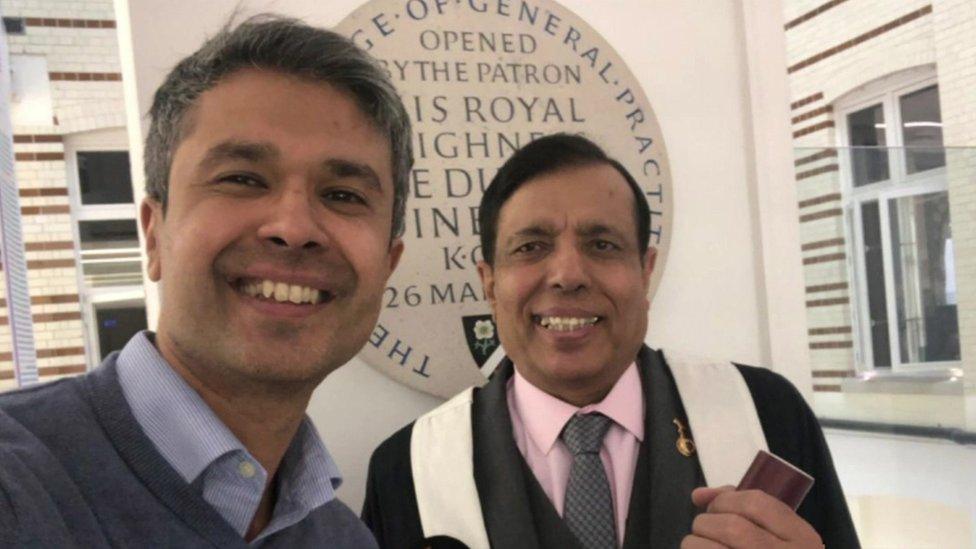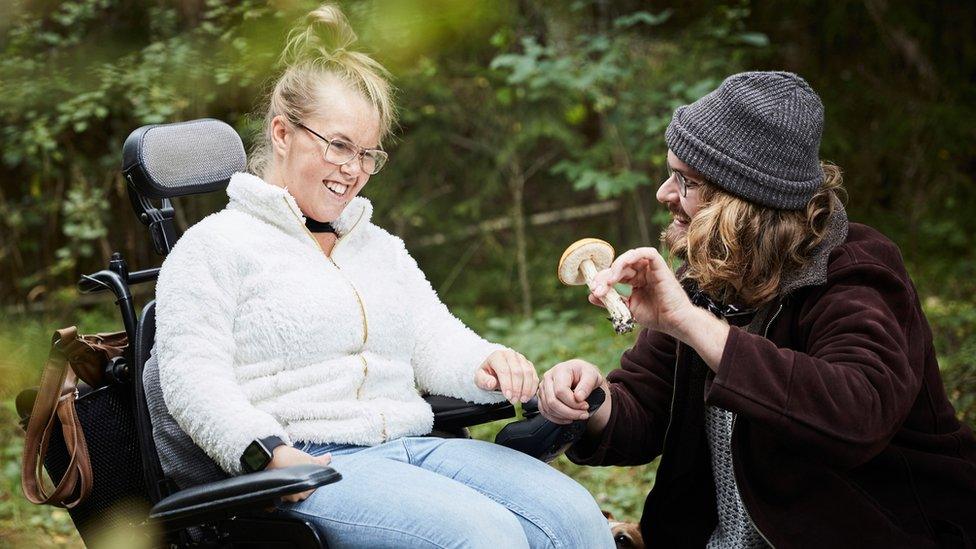Long waits for ambulances continue in England
- Published
- comments

Patients needing ambulances for life-threatening calls are often waiting longer than they should, latest NHS England figures show.
The average response time was around eight and a half minutes in August - the target for urgent calls is seven minutes.
Data also reveals the number waiting for routine operations rose to a record high of 5.6 million in July.
The NHS in England is set to receive an extra £5.4bn over the next six months.
The money has been allocated to help the health service respond to Covid-19, and to tackle the backlog caused by the pandemic. Since it began, hospitals in England have treated more than 450,000 patients with coronavirus.
MPs this week also voted for a longer term plan for a new tax to fund health and social care.
NHS England figures show that waiting times for ambulances were slightly shorter, on average, in August than in July. But they were still more than one minute longer than the seven-minute target for responding to the most urgent calls.

These are for people who are struggling to breathe or have had a cardiac arrest.
The average response time for an ambulance that can take a patient to hospital - rather than a paramedic coming by bike or car - for this category in August was close to the worst on record - 11 minutes 10 seconds.

Have you experienced a long wait for an ambulance? Please share your experiences.
WhatsApp: +44 7756 165803, external
Tweet: @BBC_HaveYourSay, external
Please read our terms & conditions and privacy policy

And for category 2 emergency calls - which cover heart attacks, seizures and road traffic accidents - the average wait was more than 38 minutes, despite a target of 18 minutes.
'We had missed the window to save my father'

Dr Aseem Malhotra said the ambulance for his father, Prof Kailash Chand, should have arrived more quickly
Heart specialist Dr Aseem Malhotra believes his father's death in July could have been prevented if an ambulance had arrived more quickly.
His father, Prof Kailash Chand, had complained of chest discomfort before asking for help from neighbours, who were also doctors. They called an ambulance because they believed Prof Chand had had a cardiac arrest, and tried to resuscitate him.
Dr Malhotra was on the phone to them at the time.
"I stayed on the line - 10 minutes passed, 15 minutes passed, 20 minutes passed.
"It took over 30 minutes before the ambulance arrived," he said.
Dr Malhotra then saw his father being attached to a heart monitor via a videocall.
"It was the flat line. There was nothing to shock.
"We had missed that window. My father was gone."
Dr Malhotra said if he'd known the ambulance would take so long, he would have asked the neighbour to take him straight to hospital.
North West Ambulance says it is investigating the incident.

The figure of 5.6 million people waiting to start routine NHS hospital treatment is the highest since records began in August 2007, and up from 5.45m in July.
Nearly 1.8 million have been waiting longer than 18 weeks, while more than 293,000 have been waiting for more than a year.
That number has fallen - a sign of efforts to tackle the backlog caused by Covid.
'Millions more treatments'
NHS England said staff had contended with one of the busiest summers on record in A&E, and hospitals were currently treating more than 6,000 patients with Covid. A total of around half a million Covid patients have been treated to date in English hospitals.
Prof Stephen Powis, national medical director for NHS England, said: "NHS staff have pulled out all the stops to deliver millions more tests, checks, treatments and operations than they did last summer despite caring for many more Covid patients.
"We do not know how many of those who held back from accessing care during the pandemic still need treatment, but we expect more to come forward in the coming months, and I urge anyone who needs the NHS to come forward."
Mr Tim Mitchell, vice president of the Royal College of Surgeons of England, said the waiting times figures showed new funding for planned surgery was "sorely needed".
"Behind these eye-watering statistics are patients waiting in pain for hip and knee replacements and for heart, brain and other operations," he said.
The new surgical hubs planned by the NHS to keep surgery going if there are further outbreaks of Covid would need additional doctors, nurses and surgeons to staff them, Mr Mitchell said.
Data shows there are long waiting times for ambulances across the three other UK nations, but these waits are measured differently and can't be directly compared.
- Published8 September 2021
